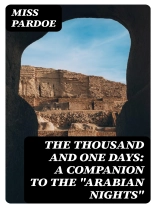In Miss Pardoe’s ‘The Thousand and One Days: A Companion to the Arabian Nights, ‘ readers are presented with a scholarly exploration of the famous tales of Scheherazade. The book provides detailed analysis of the stories, offering insights into the characters, themes, and cultural significance of the Arabian Nights. Pardoe’s literary style is academic yet accessible, making this book a must-read for anyone interested in the world of medieval Arabic literature. The historical context of the tales is expertly examined, shedding light on the social and political influences that shaped the storytelling tradition. Pardoe’s work serves as a valuable companion to the original Arabian Nights, enriching readers’ understanding of this timeless collection of stories. Miss Pardoe’s extensive research and deep knowledge of the subject matter are evident throughout the book, making it an indispensable resource for scholars and enthusiasts of Arabian literature. Her passion for the tales of Scheherazade is evident in every page, making ‘The Thousand and One Days’ a captivating and informative read for anyone seeking to delve deeper into the world of Arabian storytelling.
Sobre o autor
Miss Julia Pardoe was a notable British author and poet of the 19th century, remembered for her prolific contributions to literature and travel writing. Born in 1804, Pardoe’s literary career flourished with an array of works that encompassed historical accounts, novels, and literary sketches. A contemporary of the Brontë sisters, Pardoe’s writing was characterized by its vivid narration and attention to detail, often immersing her readers in the settings she so eloquently described. Her fascination with the Ottoman Empire led her to pen titles such as ‘The City of the Sultan; and Domestic Manners of the Turks, ‘ which provided insights into Turkish life and customs, drawing on her observations from her travels to Constantinople in the 1830s. Notably, ‘The Thousand and One Days: A Companion to the ‘Arabian Nights” stands among her cherished works, wherein Pardoe employs the frame narrative style to present enchanting tales that echo the exoticism and allure of the Arabian Nights. This work further cemented her reputation as a captivating storyteller who could deftly blend the historical with the fantastical. Pardoe’s literary style, marked by lush descriptions and an empathetic portrayal of other cultures, made her work accessible and educational, reflecting the Victorian era’s curiosity about distant lands. She passed away in 1862, leaving behind a rich legacy that continues to be studied for its contributions to 19th-century travel literature and narrative prose.












